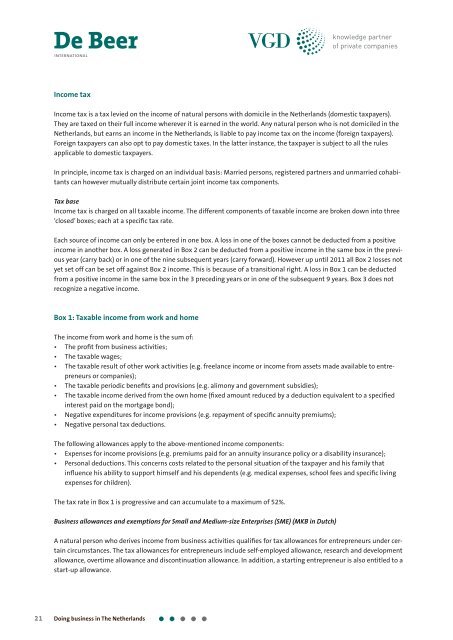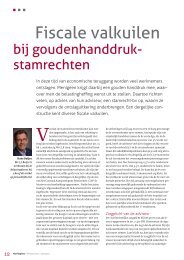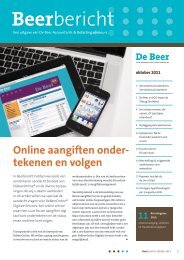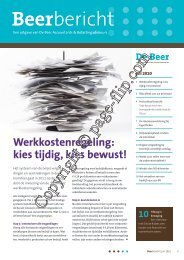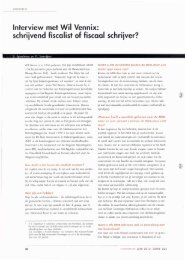De Beer
De Beer
De Beer
- No tags were found...
Create successful ePaper yourself
Turn your PDF publications into a flip-book with our unique Google optimized e-Paper software.
<strong>De</strong> <strong>Beer</strong>INTERNATIONALknowledge partnerof private companiesIncome taxIncome tax is a tax levied on the income of natural persons with domicile in the Netherlands (domestic taxpayers).They are taxed on their full income wherever it is earned in the world. Any natural person who is not domiciled in theNetherlands, but earns an income in the Netherlands, is liable to pay income tax on the income (foreign taxpayers).Foreign taxpayers can also opt to pay domestic taxes. In the latter instance, the taxpayer is subject to all the rulesapplicable to domestic taxpayers.In principle, income tax is charged on an individual basis: Married persons, registered partners and unmarried cohabitantscan however mutually distribute certain joint income tax components.Tax baseIncome tax is charged on all taxable income. The different components of taxable income are broken down into three‘closed’ boxes; each at a specific tax rate.Each source of income can only be entered in one box. A loss in one of the boxes cannot be deducted from a positiveincome in another box. A loss generated in Box 2 can be deducted from a positive income in the same box in the previousyear (carry back) or in one of the nine subsequent years (carry forward). However up until 2011 all Box 2 losses notyet set off can be set off against Box 2 income. This is because of a transitional right. A loss in Box 1 can be deductedfrom a positive income in the same box in the 3 preceding years or in one of the subsequent 9 years. Box 3 does notrecognize a negative income.Box 1: Taxable income from work and homeThe income from work and home is the sum of:• The profit from business activities;• The taxable wages;• The taxable result of other work activities (e.g. freelance income or income from assets made available to entrepreneursor companies);• The taxable periodic benefits and provisions (e.g. alimony and government subsidies);• The taxable income derived from the own home (fixed amount reduced by a deduction equivalent to a specifiedinterest paid on the mortgage bond);• Negative expenditures for income provisions (e.g. repayment of specific annuity premiums);• Negative personal tax deductions.The following allowances apply to the above-mentioned income components:• Expenses for income provisions (e.g. premiums paid for an annuity insurance policy or a disability insurance);• Personal deductions. This concerns costs related to the personal situation of the taxpayer and his family thatinfluence his ability to support himself and his dependents (e.g. medical expenses, school fees and specific livingexpenses for children).The tax rate in Box 1 is progressive and can accumulate to a maximum of 52%.Business allowances and exemptions for Small and Medium-size Enterprises (SME) (MKB in Dutch)A natural person who derives income from business activities qualifies for tax allowances for entrepreneurs under certaincircumstances. The tax allowances for entrepreneurs include self-employed allowance, research and developmentallowance, overtime allowance and discontinuation allowance. In addition, a starting entrepreneur is also entitled to astart-up allowance.21 Doing business in The Netherlands


